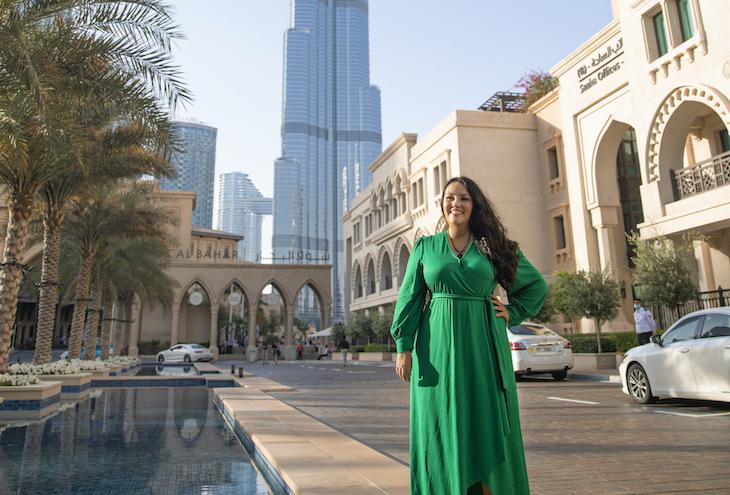People often ask Foreign Service Officer Tashina Cooper, “Why did you choose to move so far from home and pursue a career that does not benefit Native people?”
“That this career does not benefit Native people is inaccurate,” says Cooper, who is assigned to U.S. Consulate Dubai in the United Arab Emirates. That puts Cooper a long way from the Navajo Nation where she was raised.
Cooper is a diplomat, or representative of the United States government to foreign countries. As a Native American, she is a dual citizen — that is, a citizen of the United States and the Navajo Nation. Cooper states, “In this regard, I informally represent my tribal nation to the world. Representation matters. America’s diplomats should reflect our country’s diversity.”
Diplomats work for the Department of State, an agency that oversees U.S. foreign policy. The U.S. Secretary of State is the President’s primary foreign policy advisor. Diplomats represent the United States at the United Nations, negotiate international treaties, and oversee diplomatic missions, among other responsibilities.
Her work has taken her to Jakarta, Indonesia, and Tegucigalpa, Honduras. “It’s an incredible experience — a career like no other — and the best part is that it’s constantly changing,” says Cooper. She moves every three years to serve at any of the United States’ more than 270 embassies, consulates, and other diplomatic missions.
Today her full-time job is studying Persian, the official language of Iran, so she can serve in the Iran Regional Presence Office. The United States severed diplomatic relations with Iran in the aftermath of the 1979 hostage crisis and does not have an embassy in the country. Cooper explains, “The Iran Regional Presence Office in Dubai is the closest thing we have to an embassy for a country in which we lack diplomatic relations. It is our responsibility as diplomats to overcome that challenge and provide decision-makers in Washington with the most credible assessments of social, political, and economic conditions in Iran.”
“I’m fortunate to study a new language full time. I don’t know of any other profession where you can do that,” says Cooper, who speaks Indonesian and Spanish at a full professional proficiency. “Reaching a high level of fluency in other languages has increased my confidence to learn Diné Bizaad (the Navajo language). I now have a better understanding of how to learn languages. One of my life goals is to speak the language of my people fluently.”
Cooper’s assignments vary. As a consular officer in Indonesia, she conducted visa interviews in Indonesian and helped American citizens who were crime victims or imprisoned while also combating human trafficking. She represented the U.S. Embassy in the Indonesian language during live interviews on national television, where she promoted study in the United States and dispelled misconceptions about U.S. policies.
When speaking with foreign audiences Cooper states, “I try to honestly represent America’s history.” She admits, “We have inequality. Our history is replete with discrimination. Yet what sets our nation apart is our democratic ideals and the notion that civil rights and liberties should be available to all.” She continues, “Foreign audiences appreciate that Americans are willing to acknowledge when we fall short of our principles. Our greatest strength is that we are constantly aspiring to be better.”
“Service is of paramount importance to me,” says Cooper. “As a diplomat, you don’t have to abandon who you are and can continue serving tribal communities.” Cooper worked to preserve Indigenous languages in Honduras. In Indonesia, Cooper advanced U.S. foreign policy objectives to counter violent extremism by promoting tolerance among the country’s diverse and young population. This included bringing Native American dancers to serve as cultural ambassadors during exchanges.
She urges Native Americans to consider a career in the Foreign Service. According to Cooper, “When you’re a young adult, you think of a career as a final destination. But that’s not how things work — careers unfold over seasons.”
Previously, the Stanford University graduate worked at the American Indian College Fund and served as deputy executive director of the Native American Finance Officers Association. “Students have myriad interests, which can be pursued at the various stages of one’s career. The skills developed can be brought home to benefit tribal communities. For me, this has meant that I can both serve my tribal community and pursue my interest in foreign affairs.”
Cooper knows that although she lives far from the four sacred mountains of the Navajo Nation, her grandmother’s prayers protect her. “My grandmother buried my umbilical cord in the earth so I’d always be connected to my people and Nahasdzą´ą´n Shimá (Mother Earth),” she says. “I am honored to serve overseas, but eventually I will return home to begin a new season.”














